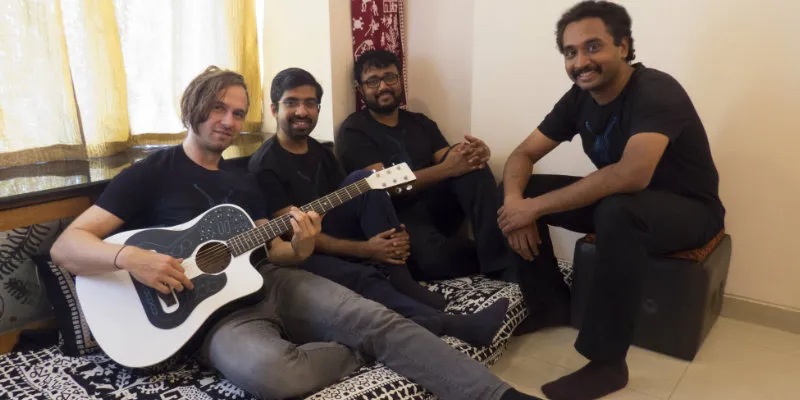How a German guitarist teamed up with IIT Bombay alumni to kickstart a Make in India musical campaign
It’s only destiny that decides whom you meet in life. When Germany-based Robin Sukroso met three IIT Bombay alumni, few could have guessed that it would herald an entrepreneurial journey. Three years of research, development, and prototyping paid off and the trio came up with a mountable, wireless, super thin MIDI controller for guitars, and ACPAD (Acoustic instruments + Pads) was launched in December 2015.

It all started in 2008 when Robin was travelling across the world on a musical odyssey. A musician himself, he aimed to study diverse techniques and styles of music. He also wanted to develop a new product and was looking for engineers with the same level of skills.
Robin, at first, created a prototype-altered acoustic guitar in Germany and performed at music festivals and concerts around the world. While en route to a concert in Goa, his guitar prototype was damaged and he sought help to fix it. Someone suggested that he write to the students of IIT Bombay; of the 300 mails he sent, 20 students replied.
Two students from the electrical engineering department at IIT Bombay, Amaldev V and Deepak Malani, came onboard to fix the guitar. The duo was later joined by Avinash J Iyer, a product design graduate student from IDC, IIT-Bombay. The repair mission soon led to the development of a wireless MIDI controller for guitars.
Kickstarter campaign…
ACPAD launched a campaign through Kickstarter in late October 2015, which continued till early December. The campaign helped them raise $330,000 and bag 1,400 pre-orders from customers from across the world.
Before this campaign, ACPAD built a community of over 25,000 newsletter subscribers, 75,000 Facebook fans; their video on Facebook received 100 million views. In the initial days, the team had to exchange ideas and communicate with different artists and engineers to understand the challenges they faced.
Communicating their exact requirements to Indian manufacturers was one of the biggest challenges as the technology was very new to the latter. After several suppliers disappointed them, they finalised the deal with a manufacturing partner who was immediately receptive to the idea of ACPAD.
We aspired to make ACPAD in India to demonstrate that hardware startups can thrive in a country traditionally known for apps and e-commerce. We hope that this initiative will inspire the Indian industry to be more open to adopt new ideas and develop cutting-edge capabilities in manufacturing,” says Robin.
Wireless MIDI controller
ACPAD is a thin universal wireless MIDI controller that can be attached to almost any acoustic guitar, bridging the gap between acoustic and electronic music. It works as a Universal MIDI controller with Ableton and Cubase in wired mode via USB or in wireless mode using Bluetooth.
Robin and the team have developed seven different prototypes so far. ACPAD comprises eight custom-built touch pads, two linear position sensing touch sliders, and 16 tactile buttons arranged on an extremely thin interface. The controller transmits the MIDI data wirelessly via Bluetooth to laptops, mobile devices, and integrates it with commonly used software.
Ten preset buttons let the user save up to 25 presets for quick access. Its two independent looper channels enable live recording and trigger loops from the guitar. ACPAD is scheduled to be released in July this year.
Target market and traction
Currently, the target markets are India, North America, and Europe. ACPAD can be pre-ordered at $299. The team is planning to participate in exhibitions, creating events, and workshops across the world to raise awareness about the product.
They are preparing to ship the first batch of ACPADs to customers worldwide. The startup is also in the process of raising funds to capitalise on the market potential and develop new hardware, software products, and produce over 10,000 units.
ACPAD has a team of 13 members including business advisors, engineers, software programmers, researchers, social media and marketing experts, business developers, sound designers, lawyers, and freelancers. In terms of revenue, they are anticipating to reach around $3,000,000 by 2016-17.
Manufacturing on a growth curve
According to India Brand Equity Foundation, India’s manufacturing sector could touch $1 trillion by 2025. The sector has the potential to contribute 25-30 percent of the country’s GDP and create up to 90 million jobs in the domestic market over the next 10 years.
Startups in the hardware space seem to be riding high on the Make in India campaign by demonstrating the power of innovation. Gurgaon-based robotics startup Grey Orange has one manufacturing unit and one assembly unit in Gurgaon, where it designs and builds products to help e-commerce, logistics, and manufacturing companies improve productivity.
Bengaluru-based wearable healthtech startup GetActive produces slim activity tracker has sold 50,000 units in 2015. Automotive startup Ather Energy has developed a lithium-Ion battery powered connected vehicle, Ather-S340 and has announced a Rs 25 crore investment to set up manufacturing base in Whitefield.







